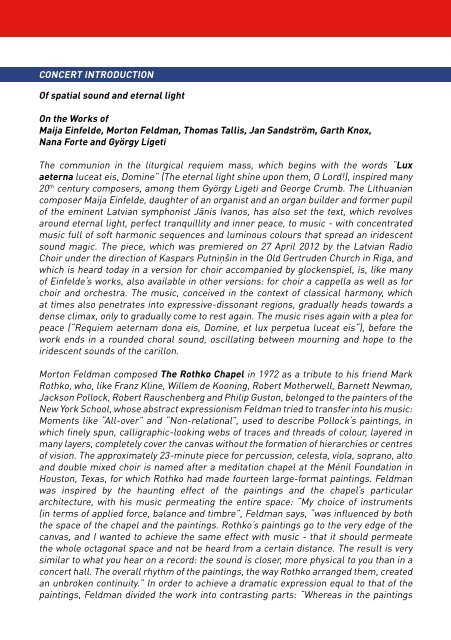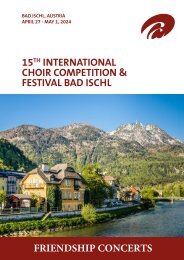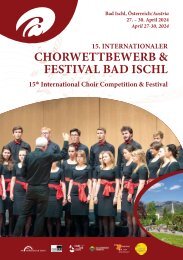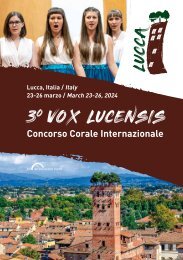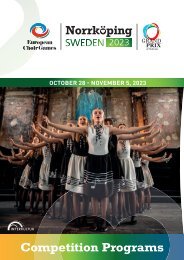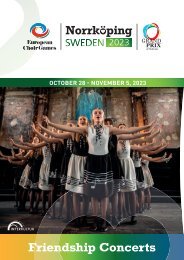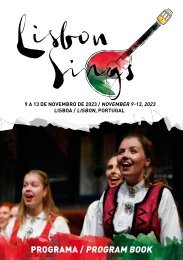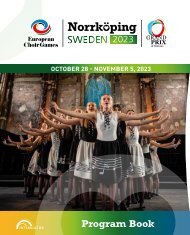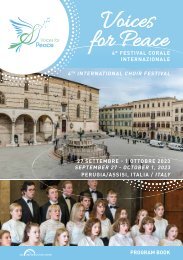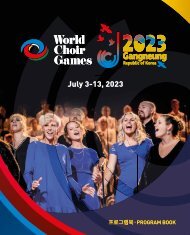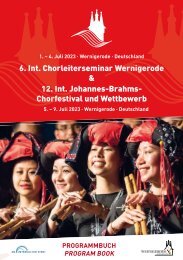Erfolgreiche ePaper selbst erstellen
Machen Sie aus Ihren PDF Publikationen ein blätterbares Flipbook mit unserer einzigartigen Google optimierten e-Paper Software.
CONCERT INTRODUCTION<br />
Of spatial so<strong>und</strong> and eternal light<br />
On the Works of<br />
Maija Einfelde, Morton Feldman, Thomas Tallis, Jan Sandström, Garth Knox,<br />
Nana Forte and György Ligeti<br />
The communion in the liturgical requiem mass, which begins with the words “Lux<br />
aeterna luceat eis, Domine” (The eternal light shine upon them, O Lord!), inspired many<br />
20 th century composers, among them György Ligeti and George Crumb. The Lithuanian<br />
composer Maija Einfelde, daughter of an organist and an organ builder and former pupil<br />
of the eminent Latvian symphonist Jānis Ivanos, has also set the text, which revolves<br />
aro<strong>und</strong> eternal light, perfect tranquillity and inner peace, to music - with concentrated<br />
music full of soft harmonic sequences and luminous colours that spread an iridescent<br />
so<strong>und</strong> magic. The piece, which was premiered on 27 April 2012 by the Latvian Radio<br />
Choir <strong>und</strong>er the direction of Kaspars Putniņšin in the Old Gertruden Church in Riga, and<br />
which is heard today in a version for choir accompanied by glockenspiel, is, like many<br />
of Einfelde‘s works, also available in other versions: for choir a cappella as well as for<br />
choir and orchestra. The music, conceived in the context of classical harmony, which<br />
at times also penetrates into expressive-dissonant regions, gradually heads towards a<br />
dense climax, only to gradually come to rest again. The music rises again with a plea for<br />
peace (“Requiem aeternam dona eis, Domine, et lux perpetua luceat eis“), before the<br />
work ends in a ro<strong>und</strong>ed choral so<strong>und</strong>, oscillating between mourning and hope to the<br />
iridescent so<strong>und</strong>s of the carillon.<br />
Morton Feldman composed The Rothko Chapel in 1972 as a tribute to his friend Mark<br />
Rothko, who, like Franz Kline, Willem de Kooning, Robert Motherwell, Barnett Newman,<br />
Jackson Pollock, Robert Rauschenberg and Philip Guston, belonged to the painters of the<br />
New York School, whose abstract expressionism Feldman tried to transfer into his music:<br />
Moments like “All-over” and “Non-relational”, used to describe Pollock‘s paintings, in<br />
which finely spun, calligraphic-looking webs of traces and threads of colour, layered in<br />
many layers, completely cover the canvas without the formation of hierarchies or centres<br />
of vision. The approximately 23-minute piece for percussion, celesta, viola, soprano, alto<br />
and double mixed choir is named after a meditation chapel at the Ménil Fo<strong>und</strong>ation in<br />
Houston, Texas, for which Rothko had made fourteen large-format paintings. Feldman<br />
was inspired by the haunting effect of the paintings and the chapel‘s particular<br />
architecture, with his music permeating the entire space: “My choice of instruments<br />
(in terms of applied force, balance and timbre”, Feldman says, “was influenced by both<br />
the space of the chapel and the paintings. Rothko‘s paintings go to the very edge of the<br />
canvas, and I wanted to achieve the same effect with music - that it should permeate<br />
the whole octagonal space and not be heard from a certain distance. The result is very<br />
similar to what you hear on a record: the so<strong>und</strong> is closer, more physical to you than in a<br />
concert hall. The overall rhythm of the paintings, the way Rothko arranged them, created<br />
an unbroken continuity.” In order to achieve a dramatic expression equal to that of the<br />
paintings, Feldman divided the work into contrasting parts: “Whereas in the paintings


